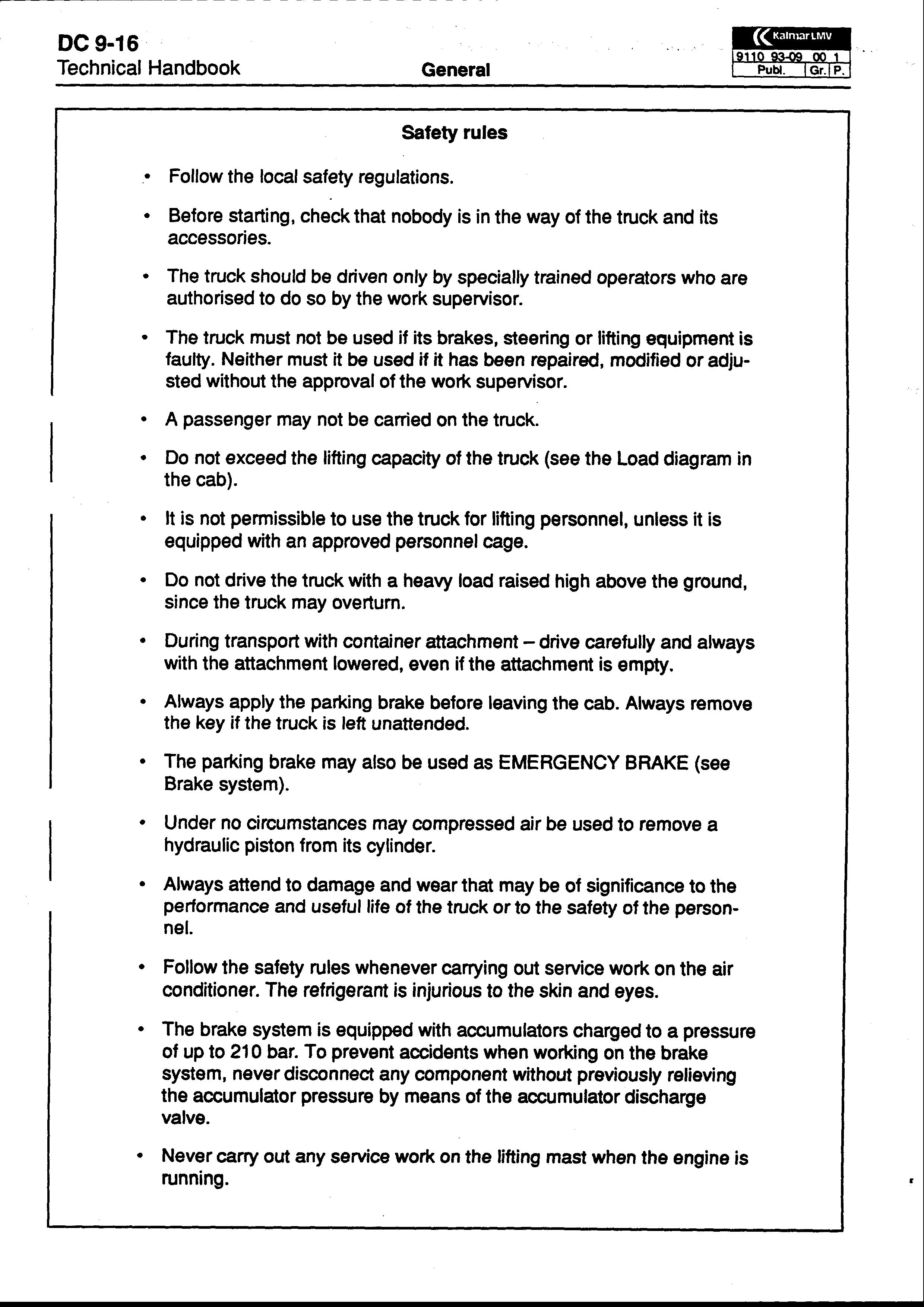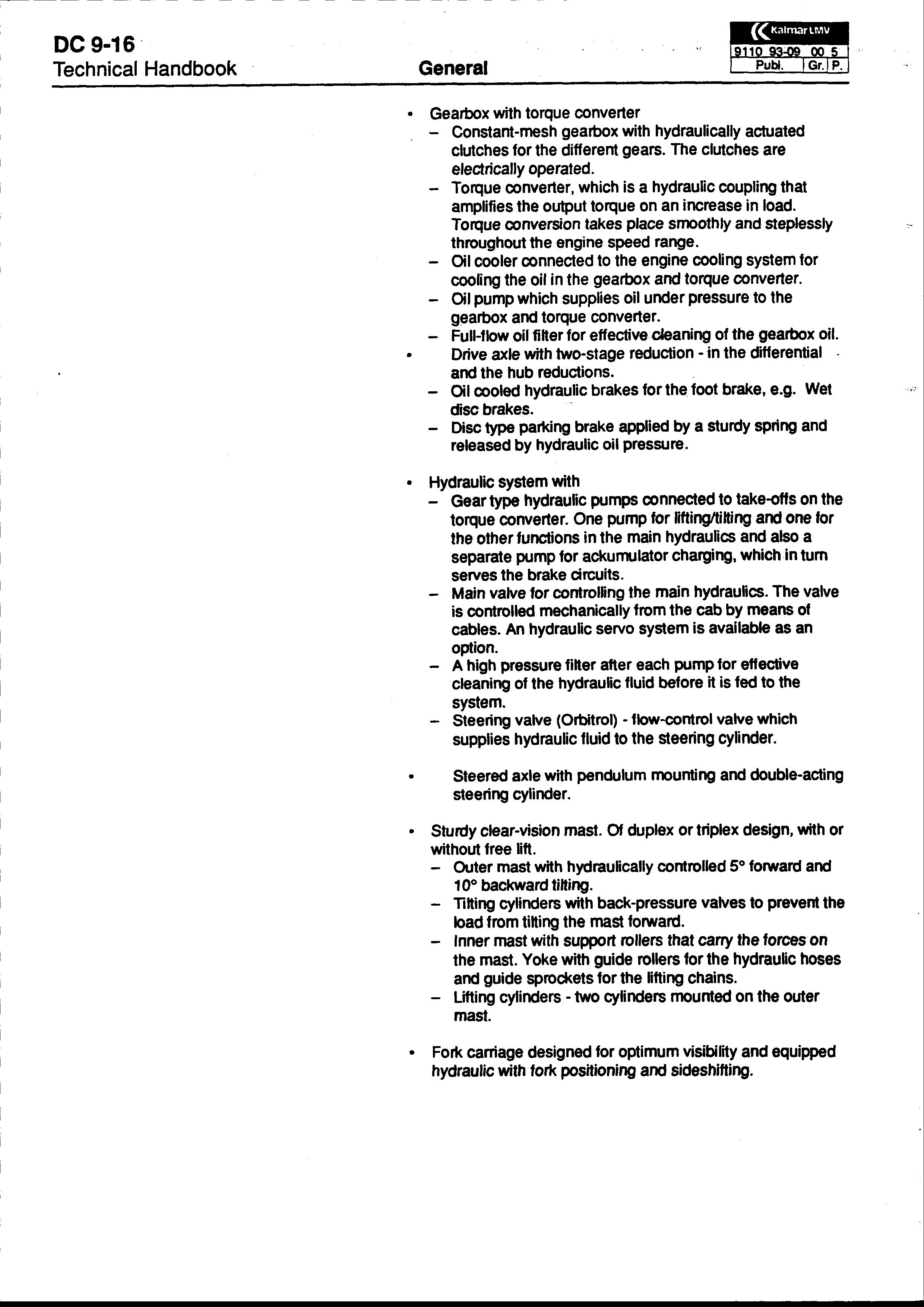Chassis and cab
Technical Handbook DC 9-16

This Handbook deals with the design and maintenance of Kalmar LMV forklift trucks.
In addition, it gives details of troubleshouting and the most common corrective maintenance.
Operation and other matters that are primarily of interest to the operator are ·ncluded in the Operator's Manual.
KalmarLMV
Electrical system
Engine
Transmission, drive axle, brakes
Steering system
We reserve the right to modify our design and material specifications without prior notice.
Hydraulic system
Lifting mast and fork .
carnage Periodic supervision
• Thank you very much for reading the preview of the manual.
• You can download the complete manual from: www.heydownloads.com by clicking the link below
• Please note: If there is no response to CLICKING the link, please download this PDF first and then click on it.







Safety Instructions for working with tyres

• Tyre changing can be dangerous and should only be carried out by specially trained personnel using proper tools and procedures. Failure to comply with these procedures may result in faulty positioning of the tyre and/or rim and cause the assembly to burst with explosive, force sufficient to cause physical injury or death. Never fit or use damaged tyres or rims.
• Deflation and dismantling
- Always check the tyre/rim assembly for proper component seating prior to removal from the truck.
- Always deflate the tyre by removing the valve core prior to removing the complete assembly from the truck or dismantling any of the component Before loosening mounting bolts, run a wire through the valve stem to ensure that it is not blocked. Ice or dirt can prevent all the air from escaping.
- Never position body in front of the rim during deflation.
- Always follow assembly and dismantling procedures outlined in the manufacturer's instruction manual, or other recognizectindustry instruction manuals. Use proper rubber lubricant. ·
- Never use a steel hammer to assembling or dismantling rim components - use a lead, brass or plastic type mallets. The correct tools are available through rim/wheel distributors.
• Rim inspection
- Always select the correct tyre size and construction matching the manufacturer's rim or wheel rating and size.
- Do not use over-size tyres, too large for the rims, e.g. 14.5 inch tyres with 14 inch rims or 16.5 inch tyres with 16 inch rims.
- Never use damaged, worn or corroded rims/wheels or fitting hardware. Always verify that the rim is in a serviceable conditioning. Always clean and repaint lightly rusted rims.
- Never use a rim/wheel component that can not be identified. Check rim parts against multi-piece rim/wheel matching charts.
• Assembly and inflation
- Always double check to ensure that the rim assemblies have been correctly assembled and that securing studs and nuts are tightened to the correct torque setting.
• When adding air to a tyre on an industrial truck, use a clip-on chuck and stay out of the danger area. If the tyre has been run flat then the rim must be dismantled and all parts inspected for damage.
• Under-inflated tyres have a serious effect on the stability of the truck and reduces the safe load handling capacity. Always maintain tyres at the correct inlfation pressures. Check inflation pressures daily.
• Inspect tyres regulary - every day if possible. Look for and remove broken glass, tom pieces of tread, embedded metal chips etc. Inspect for uneven or rapid tread wear, usually caused by mechanical irregularities, such as brakes out of adjustment or excessive toe-in and toeout. If discovered, correct the irregularity immediately.
• When installing and tightening trail wheel bolts, observe the following:
- Ensure that trail wheel or hub mounting surfaces and trail wheel fastener mounting surfaces are clean and free from paint and grease.
- Tighten bolts to specified torque settings. Use staggered sequence; i.e. top bolt, bottom bolt etc.





• Thank you very much for reading the preview of the manual.
• You can download the complete manual from: www.heydownloads.com by clicking the link below
• Please note: If there is no response to CLICKING the link, please download this PDF first and then click on it.

